You lost me in the first 30 seconds of your policy pitch.
Give me your message in a compelling manner.
Until you put your pitch into the context of bigger societal concerns, I won’t commit a penny of funding to your idea.
These were all responses from a panel of policy makers and influencers at the Science Communications for Policy Impact side event of the Landscapes for People, Food and Nature in Africa Conference in Nairobi. The session was hosted by CGIAR Research Program on Water, Land and Ecosystems (WLE), International Livestock Research Institute (ILRI), World Agroforestry Center (ICRAF) and EcoAgriculture Partners and attendees included conference participants, researchers, and communications professionals from the Nairobi DevComms Network.
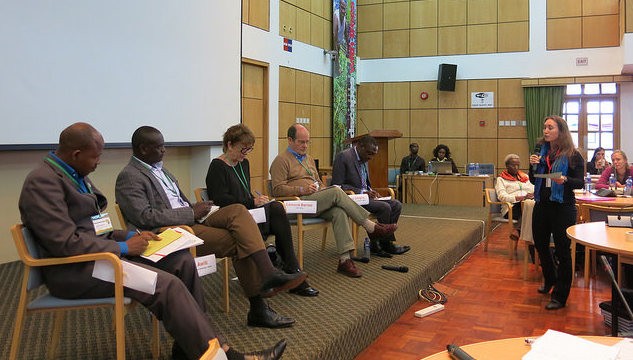 Juliet Braslow of CIAT presents her policy pitch on climate smart agriculture to the Dragon's Den, i.e. panel of policy influencers (from left: Olawumi, Awiti, Jones, Barrow, Odigha). Photo: Abby Waldorf/WLE
Juliet Braslow of CIAT presents her policy pitch on climate smart agriculture to the Dragon's Den, i.e. panel of policy influencers (from left: Olawumi, Awiti, Jones, Barrow, Odigha). Photo: Abby Waldorf/WLEDuring the “Dragon’s Den” session, researchers and communicators pitched policy recommendations to the panel who provided candid, straightforward and constructive feedback.
Policy makers are investors, said panelist Alex Awiti, Director of the East African Institute of Aga Khan University (a regional platform for policy-oriented research, public engagement and capacity building). Their biggest dividend goes to their constituents, he said. So scientists must be able to place their research recommendations in the context of bigger societal concerns. They need to create policy recommendations in election-cycle sound bytes.
Pitching to the Dragons
Round 1
Johanna Lindahl, scientist from ILRI, was the first brave pitcher to face the dragons. She approached the panel with a notecard in hand:
“I would like to talk to you about aflatoxins. As you may know, aflatoxins are toxins produced by fungi growing on crops. When people get chronically exposed they can get cancer, and it is associated with childhood stunting, and if you consume high levels you can get acute liver failure and die. Thus aflatoxins are a cause of death and the control of it cause hundreds of billions losses every year globally….. “
She then continued to describe the impact of aflatoxins in the food chain, citing data collected from her research. The audience could see the panelists eyes slowly glaze over.
“You lost me after the first 30 seconds of your presentation,” said Alex Awiti. “I feel no attachment to this issue.”
“There was no clear ask,” said CJ Jones, who did approach Johanna later to learn more about her research.
“I have no idea what you want me to do with this information. How am I supposed to solve this problem?” Edmund Barrow responded. “I was confused.”
Odigha Odigha of Nigeria agreed; there was no human angle to this story. Why should I care? Will this be something I can be remembered for after I leave office or will it help me get re-elected? If not, you’ve lost me.
The Policy Panel
It was like watching American Idol. Panelist CJ Jones, CEO of Acre Micro-Insurance, played a compelling version of Simon Caldwell, sharp, witty and straight to the point.
Alex Awiti offered strong yet constructive advice on how to better appeal to a policy maker’s interests. Edmund Barrow, Director of the Global Ecosystem Management Program of IUCN, gave thoughtful but blunt feedback, reminding pitchers that they must deliver one strong message with clear, actionable recommendations.
Odigha Odigha and Ayodele Olawumi, both Nigerian from the Cross River State Commission and Ministry of Environment, respectively, reminded the pitchers to connect their initiative to the broader goals of the policy maker and present recommendations that can be implemented within the politician’s election cycle.
Audience members were sitting on the edge of their seats.
Round 2
Liz Kahurani from ICRAF pitched next. She played the hunger card, reminding the panelists that almost 900 million people go to bed hungry each night, as she asked them to consider the importance of food security on their agendas.
She said that her team had developed economic models to demonstrate how much countries would save in hunger relief funds and how many of the 900 million lives would benefit if they increased the national budget allocation to agriculture by only 15%.
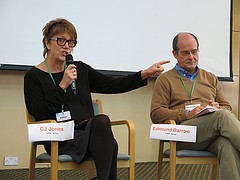 The panelists felt overburdened. “Your story and your ask should not overwhelm your target,” Jones said. “When you use common words, be aware that they can mean different things. I didn’t eat lunch so I’m hungry right now,” she explained. “There are millions of people who are hungry, but how am I going to solve that problem? It’s too big, too overwhelming. It feels unsolvable,” Jones said.
The panelists felt overburdened. “Your story and your ask should not overwhelm your target,” Jones said. “When you use common words, be aware that they can mean different things. I didn’t eat lunch so I’m hungry right now,” she explained. “There are millions of people who are hungry, but how am I going to solve that problem? It’s too big, too overwhelming. It feels unsolvable,” Jones said.
Round 3
By the third pitch, it was clear that the panelists’ messages were sinking in.
“I have a question,” Ake Mamo of ICRAF began, requesting the panelists to pretend that they are local government representatives from a specific kebele (local administrative unit) in Ethiopia. “How many of you rent your homes? How many own have mortgages or own your homes? How many of you would like to own your home one day?” Panelists raised their hands accordingly.
“My uncle shares the same dream as each of you,” Ake said. “But he cannot own his home because he knows that at any time he could be handed an eviction letter and he would lose everything. So he has no incentive to think about the sustainability of his land. However, if one of your key priorities is food security and the key to food security is sustainable land management, the creation of land ownership becomes an imperative.”
Now this stuck with the panelists. She played the human angle extraordinarily well, they responded. But she was still missing a clear ‘ask.’ “What type of land ownership do you want us to address?” asked Barrow. “What is the exact action we can take? The message was conveyed very well but the recommendation or action point was lost.”
Round 4
Similar feedback was given to Juliet Braslow of CIAT. She had considerable advantage as the final pitcher of the day, using the feedback given to the previous three pitchers in her request for policy makers to adopt climate smart agriculture.
“I want you to come with me on a journey 50 years into the future,” she began. You are in a village in your country, visiting a family with three hectares of land and two cows. But fast forward 50 years and this family doesn’t know when they will get their next meal. There is no money for school fees, yields have declined, and they are struggling to survive.
“I want to share with you a different vision of the future,” Juliet then said. “One in which agriculture thrives, families have enough food to eat, and people are prosperous. I want to introduce you to climate-smart-agriculture….”
And Braslow’s pitch continued to sell the climate-smart agriculture approach to the panelists.
Now, you can probably start guessing what the panel’s reaction was. Good human angle, good engagement with the panelists. But no clear ‘ask.’ And 2050 is way beyond a politician’s term to grab his or her interest. Climate-smart agriculture is a broad concept, so panelists were left wondering what action they could take, what role they could play.
The panelists cautioned against the use of jargon such as “climate-smart agriculture"; what does it really mean? But Jones offered a twist: If you’re talking to policy makers about “climate-smart agriculture”, play on the word smart…smart agriculture, smart policies, smart policy makers, smart government, etc.
Taking a second stab at the dragon’s den
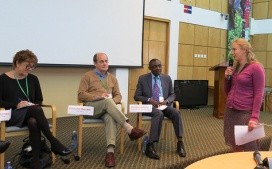
At the end of the session, Johanna Lindahl decided to re-pitch her recommendation to the panelists. She started by asking the panelists a question:
“Do any of you have children? I am sure some of you do. And when your children were small, I am sure that you were concerned about the safety of their food; you wanted them to have safe food. But some poisons are invisible. They are tasteless and odorless. Such are aflatoxins. Any child that is born in East Africa today will have aflatoxins in his or her food…”
She then asked the panel to consider a way of making use of contaminated crops (in animal feed) that would not hurt human health. This can be done quickly and with your support; over the next few years we can reduce the contamination of our food chain.
Lindahl created a connection with the policy makers; she appealed to their self-interest and figured out what was important to them. She presented her issue as doable within an election-cycle, making it actionable. And her second pitch was delivered in half the time of her first.
Panelists complimented Lindahl on the great improvement, but were still, they said, left wondering exactly what she was asking them to do.
The immediate gain needs to be made obvious, Lindahl reflected.
Taking advantage of opportunity
The importance of communicating science recommendations to policy makers was the focus of a recent feature in The Guardian: Top 20 Things Scientists Need to Know about Policy-Making.
“Scientists have incredible opportunities to influence public opinion and policymaking at the many conferences and events where they make their presentations. But they usually squander these opportunities,” said Susan MacMillan, who leads awareness and advocacy communications at ILRI.
“If you want to get on a policy maker’s radar, you should be able to say what you have to say in 2 minutes,” she said.
This is valuable advice for researchers and communicators who plan on pitching policies. But it is also pertinent for any scientist discussing her research at any sort of event. “If you can’t explain your science to a policymaker, you aren’t going to do any science that’s going to make any difference to anyone,” said Awiti.
Now the challenge will be taking this advice forward and into action! For a full list of Do’s and Don’ts, read Susan MacMillan’s article, which was generated from this side event.
Juliet Braslow and Johanna Lindahl were able to use the advice they received during engagement with policy makers the following week.



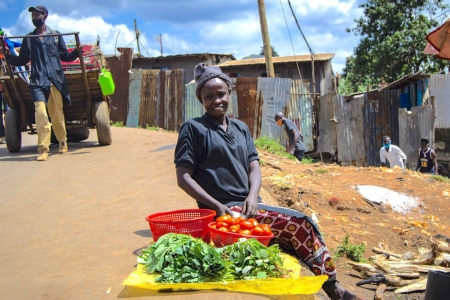

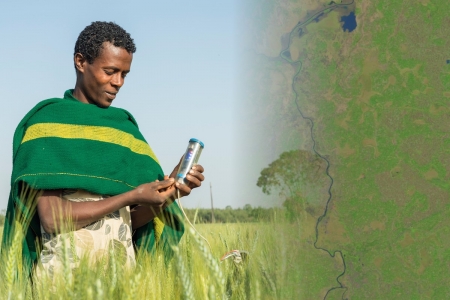


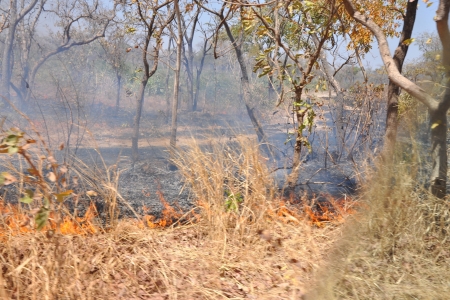

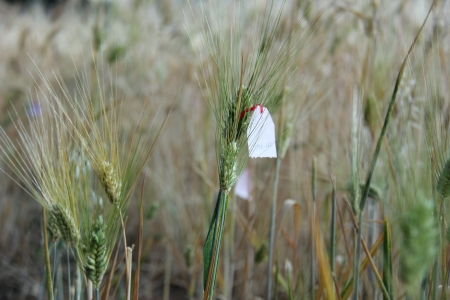
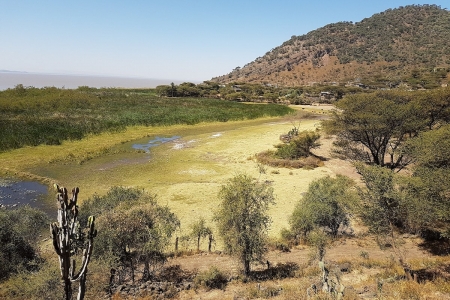
Comments
This was a fascinating read – thank you very much for posting. It's a perennial issue, that scientists need to be able to better communicate i) the reasons for, ii) results of, and iii) implications/applicability of their research. Accordingly, they have to clearly tailor their messages and consider carefully how the wheels of policy turn.
However, why should the science community have to do all the running? Why is there no mention of the scientific illiteracy of many policymakers and the implications of this? Why no allusion to policymakers who take a clear scientific solution to a problem and then mangle it beyond recognition so that the solution no longer address the problem, leading to policy failure? Why no critique of the unrealistic expectations of some policymakers in demanding simple, short-term solutions to complex, long-term problems?
Alex Awiti states a very important lesson with the comment: “If you can’t explain your science to a policymaker, you aren’t going to do any science that’s going to make any difference to anyone." As researchers, we should all be mindful of this. However, one could just as easily make the statement:
"If a policymaker cannot understand the science, then how can they hope to develop meaningful and effective policy that will make any difference to anyone?".
As the demand for "evidence-based policy" increases, both parties have to come to the table.
...and, if you're going to reference the 'top 20 things that scientists need to know about policy', then you should really refer to the article that spawned it:
https://www.theguardian.com/science/2013/nov/20/top-20-things-politicians...
Hi Simon,
Thanks - you raise some pertinent issues that we didn't address in our Dragon's Den session but that certainly deserve our attention. And thanks for sharing the other article from the Guardian which is equally as important.
While I agree that policymakers need to come to the table, at a certain point it becomes unrealistic to expect them to understand the science in its entirety. Especially since they are often dealing with such a wide range of issues. However, I do think that since research for development approaches are now stressing 'outcomes' instead of just 'outputs', research projects are increasingly including policymakers from the onset of the project, which fosters a much stronger mutual understanding between policymakers and researchers.
I will make sure to include your questions in future sessions that we will run in our effort to continue these conversations on how we can better communicate with policy makers and vice versa.
Many thanks for the response Abby. Certainly, the science/policy nexus is an area that is critically important, fascinating and frequently highly frustrating! I agree, that bureaucrats have to be across many topics simultaneously, and this often precludes possessing detailed knowledge in particular areas – however, this is precisely why we need recourse to scientific expertise; to inform policy, its implementation and the monitoring of its effectiveness. From an anecdotal perspective of operating within a large bureaucracy as a science-policy adviser, the paucity of context specific knowledge demonstrated as one climbs higher up the bureaucratic food chain, is often breathtaking. This situation is also encapsulated nicely in the literature, via this gem from Tullock (1965), 'The Politics of Bureaucracy':
"...in practice, high-level officials frequently demonstrate publicly the most egregious ignorance concerning the area that they allegedly supervise."
Coyne (2008) in "The Politics of Bureaucracy and the failure of post-war reconstruction", examines the reasons for this.
You make a really important point in your comment, regarding the need for greater accountability of information use, as policy strives to move from input/output driven progress to an approach that demonstrates performance against outcomes.
Good luck with similar future events. All the best, Simon
Hi Simon, I have witnessed Tullock's statement in action many times, as it seems you have as well. I will be looking into the two sources you shared with great interest.
Thanks again for your feedback!
Hi Abby,
An excellent article about crucial yet tricky work. Really insightful with a big take away message for scientists and communicators. It really hits home that It's not just 'evidence-based policy', but 'evidence plus outcomes-based policy'. A great read.
Best wishes,
Dharshani
Hi Dharshani,
Thanks! It was hugely informative for me and we're hoping to continue these sessions and learning opportunities. I'll let you know if we host any in Sri Lanka!
Hi Abby,
More CGIAR scientists should be put through this exercise. I am always amazed at how lousy we scientists are at communicating with policy makers--then we write learned articles blaming them for "lack of commitment" etc. When I explain to people what I do as a consultant now, I often include helping scientists communicate with policy makers. The Nile BDC program had some success in this--but follow-up by the scientists is an issue. Thanks for doing this.
Hi Doug,
Thanks - we're really hoping to expand this type of exercise in CGIAR meetings and conferences. Trying to adapt it for smaller sessions and meetings now as well. I will keep you informed!